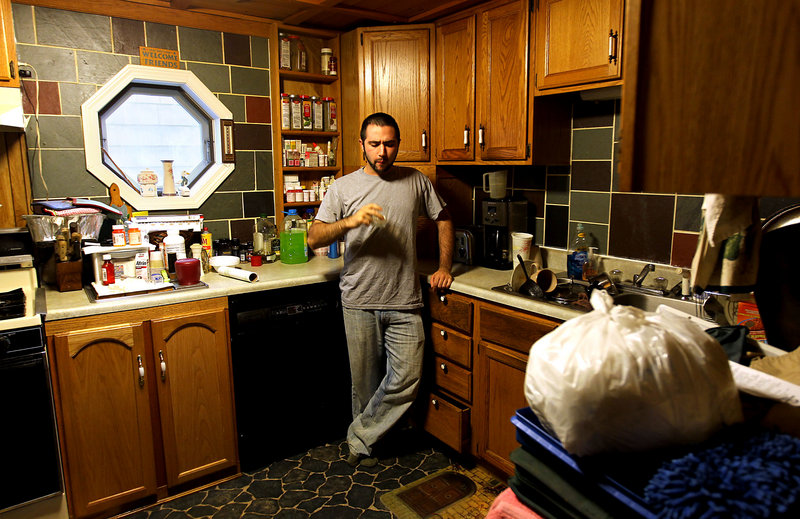BERLIN, N.H. — Mike Secinore is pinning his hopes on prison.
Fresh with a criminal justice degree from the local community college, the 20-year-old Berlin native plans to apply for a corrections officer job at the federal prison expected to open in the city next summer.
There aren’t many options in this northern region of New Hampshire, where major employers have closed their doors in recent years and further unemployment beckons if the last surviving paper mill shuts down this week, letting 240 workers go.
“I’m really wanting to have a career, not just a job,” said Secinore, who recently lost a counter position at an auto parts store. He worked there for five years, coping with a wage freeze and a cut in hours. “I really need something where I’m going to make money.”
Although rural communities have successfully lobbied for – and built – prisons for years, not many studies have been done on their economic impact.
Some studies indicate slight economic gains for some prison towns, according to a Congressional Research Service report in April. Others that have become prison anchors might have not grown as fast as those without prisons.
Florence, Colo., where a federal prison complex went up in 1994, was once a major oil producer and gold-smelting center and now has some new businesses.
New federal prisons have recently started hiring in West Virginia, which has seen a decline in coal jobs, and in an impoverished farming community in California. Others are being built in Mississippi and Alabama.
The population of Berlin, once above 22,000 during the 1920s when the paper industry was at its peak, is down to under 10,000 as mills shut down and people leave in search of new opportunities, including many of Secinore’s peers. The population is aging; the median age in the county is 44.
For some, like Secinore, there is hope the prison could take away some of the sting, providing jobs and business opportunities. It’s expected to employ about 330 workers, with 60 percent – about 200 – coming from New Hampshire; the rest would be brought in from other federal prisons.
Others aren’t as hopeful. Back in 2002, Berlin residents voted in favor of a proposal to bring in a federal prison. Today, strict requirements for the jobs, among them that employees be hired before age 37, have diminished some of the excitement.
Stay tuned, supporters say.
“There are some people within the community that still don’t like the federal prison, that don’t think it’s going to do anything for us,” said Diana Nelson, who works at the Berlin office of the state Department of Employment Security.
“But I’ve seen this project since day one, and I saw what just the construction workers coming in have done for the local economy – they’re buying cars, eating in the restaurants, Dunkin’ Donuts,” she said. “It’s little stuff, but they’re here and they’re spending money.”
The federal Bureau of Prisons estimates the medium-security prison in Berlin will contribute about $38 million annually to the local and regional economy, with most of that spent on salaries, goods, services and utilities.
Many of the 1,700 inmates will serve sentences for drug- and firearms-related crimes in the large, white complex on a hill north of the city with a view of the Presidential Mountain range.
A recruitment team made up of employees at the White Mountains Community College, the employment security office, economic development agencies and community leaders has been holding sessions to inform businesses and potential employees about the prison.
Prison jobs wouldn’t be available to many of the mill workers, who are 50 and older, but team members see the potential for a ripple effect once the prison starts hiring.
Younger people who are hired would leave job openings in the area, they say.
“If the Bureau of Prisons hires a warehouse worker from the Berlin Walmart, that’s going to open up a steady-paying job for someone in the community,” bureau spokeswoman Cathi Litcher said.
Murray Rogers was one of 303 casualties of the last mill closing, in 2007 in Groveton, about 25 miles northwest of Berlin. Rogers, a welder, found work at a construction firm. Others trained for medical coding, nursing and other fields.
“The majority of the people are making, at most, two-thirds of what they made in there,” said Rogers, who also managed a state re-employment center for the workers.
Some people retired, others moved away, and others are still looking for work after they were hired by other companies that eventually closed, he said.
In the case of federal prisons, the government helps the community arrive at an estimate of how many people would be hired locally, but that number often isn’t met, according to Eric Williams, assistant professor at the Department of Criminology and Criminal Justice Studies at Sonoma State University north of San Francisco.
“The biggest reason it doesn’t happen is that not enough locals can qualify for these jobs,” Williams said.
In addition to the age limit, prospective employees must pass checks of credit, job history and criminal record.
Copy the Story Link
Send questions/comments to the editors.



Success. Please wait for the page to reload. If the page does not reload within 5 seconds, please refresh the page.
Enter your email and password to access comments.
Hi, to comment on stories you must . This profile is in addition to your subscription and website login.
Already have a commenting profile? .
Invalid username/password.
Please check your email to confirm and complete your registration.
Only subscribers are eligible to post comments. Please subscribe or login first for digital access. Here’s why.
Use the form below to reset your password. When you've submitted your account email, we will send an email with a reset code.